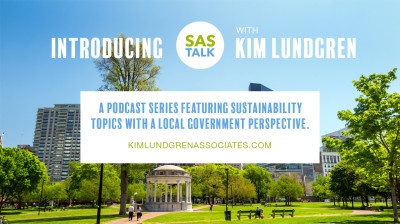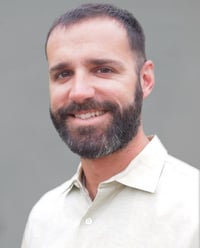I like to talk, and I have a lot to say. And that’s particularly true when it comes to sustainability and  climate issues and how local governments are leading the way with solutions. That niche has been my passion and career for nearly two decades. During that time I’ve spoken to and been inspired by so many people who are fighting the good fight at (or in support of) the local government level -- with amazing results, overcoming significant challenges, employing innovative approaches, and willing and eager to learn from and help others. Ultimately, I wanted to share those conversations in an accessible way.
climate issues and how local governments are leading the way with solutions. That niche has been my passion and career for nearly two decades. During that time I’ve spoken to and been inspired by so many people who are fighting the good fight at (or in support of) the local government level -- with amazing results, overcoming significant challenges, employing innovative approaches, and willing and eager to learn from and help others. Ultimately, I wanted to share those conversations in an accessible way.
Enter my new podcast: Sustainability Action Series: SAS Talk with Kim. You can listen now or download the first three episodes which focus on climate resilience. We’ve got new episodes on PACE financing and infrastructure in the works for early 2017. If you’ve got suggestions for topics or guests, send us an email at sastalk@kimlundgrenassociates.com.
We timed the launch to give everyone a break from the incessant holiday music. So feel free to turn off “Jingle Bells” and tune in to our podcast.
 Missy Stults, climate and sustainability consultant
Missy Stults, climate and sustainability consultant
My first guest is Missy Stults, a climate and sustainability consultant with whom I have worked for many years, starting in 2007 when I hired her at ICLEI. Missy went on to become the Climate Programs Director there. She recently completed her dissertation at the University of Michigan and published her results of research on the climate adaptation plans for 44 different cities.
Missy has been immersed in the climate adaptation issue for a decade in her academic, professional and personal life and, as always, was a joy to talk to.
A couple of quick takeaways from our chat:
- Local communities are experiencing the impacts of climate change right now -- there is an intimacy and urgency of climate change at the local level
- Cities have to “Manage the unavoidable and avoid the unmanageable”
- Resilience is “bouncing forward,” not just back (using poverty as an example)
- Climate adaptation doesn’t have to be shiny and new or “innovative.” Local governments already have most of the tools they need at their disposal.
 Timothy Burroughs, City of Berkeley Chief Resilience Officer
Timothy Burroughs, City of Berkeley Chief Resilience Officer
I have a feeling I’ll be interviewing a ton of my former ICLEI colleagues as it was certainly a breeding ground for so many of the movers and shakers in today’s sustainability circles, particularly at the local level. And that includes my second guest, Timothy Burroughs who left ICLEI in 2007 to be the Sustainability Director for the City of Berkeley, a position he left recently to become the City’s first Chief Resilience Officer. Timothy is at the forefront of this movement (spearheaded by the Rockefeller Foundation’s 100 Resilient Cities initiative) to help cities be “more resilient to the physical, social and economic challenges that are a growing part of the 21st century” -- including climate change.
Some of what Timothy shares in this podcast interview:
- He considers his position as Chief Resilience Officer a “silo-busting role”
- “Resilience is more of a practice or an approach that focuses on designing policies and programs and services in a way that can help address more than one challenge at one time and create multiple benefits for multiple stakeholders in the community.”
- Equity is a key part of resilience. For Berkeley, a key threat to consider is an earthquake. Not everyone will be impacted by an earthquake in the same way, and it could exacerbate existing social stresses
- Kim Alert: IDEA I LOVE!! Berkeley incentivizes block parties for neighbors to get to know each other (improving culture, quality of life and preparing folks to help one another during a disaster) by giving the street a dumpster for a long weekend for free bulk disposal.
- Tips for other cities with or without a Chief Resilience Officer include:
- identify players in your community that you could partner more closely with;
- grow champions within the local government; and
- encourage connectivity at the neighborhood level.
 Joyce Coffee of Climate Resilience Consulting
Joyce Coffee of Climate Resilience Consulting
The 3rd in this “mini-series” of resilience-focused podcasts is my interview with Joyce Coffee of Climate Resilience Consulting. Joyce and I met when she was with the City of Chicago, where she pioneered adaptation planning and public private partnerships as the lead on the Chicago Climate Action Plan. Joyce now is a trusted advisor for high level resilience groups like the Global Adaptation and Resilience Investment work group, and the American Society of Adaptation Professionals.
Joyce and I discussed financing options for climate adaptation work, and she had a few things to say:
- There are problems aligning the needs with the current investor approach. Cities are reluctant to take on more debt for fear of how it will affect credit rating. Yet they need money for long-term investments like infrastructure, and “investors who are looking to a different future than the past...you don’t see climate change in quarters” which is the way Wall Street operates. “Wall Street quarterly reporting cycle at odds with how infrastructure works” which is more of a 50-year horizon.
- Need patient, long-term investors and for shareholders to ask more than quarterly questions.
- Cities need to look at cost avoidance and use climate models to model risk, prioritize investments and predict ROI. She goes into detail about how cities can use the insurance companies (especially in the wake of Hurricane Andrew in 1992) as an example.
- Innovative financing tools like Resilience Bonds could help cities that have major infrastructure projects at risk from sea level rise (Joyce’s recent blog post, “Finding Cash in the Couch Cushions for Climate Adaptation,” breaks down some of these financing tools)



